04 Jul 2023 - {{hitsCtrl.values.hits}}
The Domestic Debt Optimization (DDO) or Domestic Debt Restructuring (DDR) proposal, which received parliamentary approval last Saturday, has generated significant discussion within the general public, business community, trade unions, economists etc.
Opinions on the matter are divided, with some expressing confidence in positive outcomes, while others foresee additional challenges ahead.
Mirror Business, seeking to gain insights into the DDO, reached out to various sectors and sections of the business community, trade unions and academia.
Their opinions could shed light on what the DDO entails and the potential outcomes it may bring to their respective industries and to the overall economy.
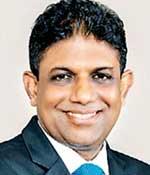 Sri Lanka Banks’ Association Chairperson Bingumal Thewarathanthri
Sri Lanka Banks’ Association Chairperson Bingumal Thewarathanthri
We congratulate the Ministry of Finance and the Central Bank for achieving this critical milestone in the overall debt restructuring process. If we get all the required parties aligned, we can aim to complete the entire debt restructuring process by September/October of this year.
Looking at the interest burden and for Gross Financing Needs to be at 13 percent by 2027, DDO was essential. We have achieved a fair amount of debt relief targets through the DDO process – still is a significant pressure on interest cost. Thus, the government will have to aggressively drive revenue collection to a reasonable level to sustain the economy. Without this, Sri Lanka will have inadequate funds for development needs and growth in the medium term will be hampered.
Banks hold over Rs. 4 trillion of the entire Treasury bond portfolio of Rs. 9 trillion. Some of these funds were deployed in T-bonds for liquidity management purposes by banks. In a re-profiling scenario, banks have to take a massive day one loss that could lead to a capital erosion and put the entire banking system under pressure. Banks are also paying close to 50 percent as tax with a rising Non-Performing Loan (NPL) ratio of 13.2 percent. Any more stress would have put the entire economy in danger. Since banks are now excluded from the DDO, they can focus on lending very aggressively and revive the economy. Banks will also have some leeway to write off some bad book interest and move forward with restructuring work.We also believe that the interest rates will come down in a couple of months to mid-teens. As always, banks will play a significant role in the economic revival process and keeping the capital at a healthy level was a good call.
With debt sustainability and confidence regained from the Institutional, Multi-lateral and Bi-Lateral lenders for non-commercial borrowing to bridge the GFN we are positioned to attract the FDI that is desperately needed. In terms of key challenges, the biggest challenge is crossing the debt restructuring. Now we know there is a DDO being announced and there will be an external debt restructuring as well, so you have to work with the bilaterals, multilaterals, and ISB holders. Getting all that aligned to a proper formula, getting everybody’s buy-in, and getting debt relief of US$ 17 billion from the debt pile of slightly over US$ 80 billion will be crucial for Sri Lanka, because there are multiple partners to negotiate with – it’s not an easy process.
The second challenge is on SOE reforms. We did very well in the last couple of months – getting into cost-reflective pricing, which we have never done, so now people are paying the actual price of a particular commodity. Reforming SOEs will be critical for the country to get the maximum output from some of them and for the people to benefit. Having political stability for the reforms will be critical. That’s another big challenge we see. Whether we have the political will to do some of these reforms will be a critical factor.
The other challenge is revenue. Revenue targets are very optimistic. We are looking at Rs. 3.2 trillion worth of revenue this year. That’s very optimistic. A primary surplus of 2.3 percent by 2025 – the IMF target – will be extremely difficult for Sri Lanka to reach with the current taxpayer base. Those are some of the challenges we see in the short term.
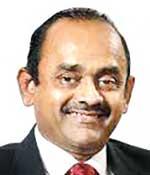 People’s Bank Chairman Sujeewa Rajapakse
People’s Bank Chairman Sujeewa Rajapakse
We highly welcome the DDO proposals put forward by the government, especially given the fact that the country was facing unparalleled challenges. With the proposed solution, we are confident that the country’s banking industry which happens to be the backbone of the economy will be well protected. Now the onus is on the banks to support the economic revival of the economy. I highly commend the delicate balance maintained by the government and CBSL in arriving at the DDO proposals.
 National Chamber of Exporters President Jayantha Karunaratne
National Chamber of Exporters President Jayantha Karunaratne
As the DDR has been announced, our thinking is that it may not affect banks and that the interest rates for lending may come down.
We must point out that exporters and industries incurred huge bank interest rates for borrowing during the past two years at some stage as high as 33 percent per year. Huge fluctuations in SLR and substantial increases of the cost of raw materials and other costs were seen and as a result, companies had to bear substantial losses. While some entities continued mainly to keep their market share in the international market, others scaled down. Some even closed down. Further, cost of raw materials, electricity, fuel, cost of labour increased substantially.
Taking into account the current scenario, exporters feel stability at this stage will help bring down some costs, especially borrowing costs. A drop in this will bring relief to us, enabling us to compete in the international markets. We feel we will regain some credibility in international markets as a country getting out of bankruptcy.
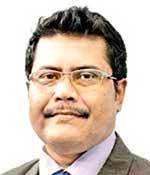 Free Trade Zone Manufacturers Association Chairman Dhammika Fernando
Free Trade Zone Manufacturers Association Chairman Dhammika Fernando
This exercise is not basically to adhere to the IMF requirement to reduce 95 percent of the Debt to the GDP of the country. It may be necessary, but we cannot fully comprehend or agree with the Central Banks’ modalities in doing so by excluding the banking sector and making the superannuation fund suffer. The reason being superannuation funds are the funds of the people and the effect on the beneficiaries is not clear so far.
Though the direct effect on our sector may be moderate to high due to the current measures (escalation of the price of utilities), our cost of production has already skyrocketed and as a result, we are fast becoming less competitive in the international market. Similarly, as employers of large numbers of individuals, if their returns on superannuation funds are affected, there can be unrest and disruption to our operations.
In terms of the outcome of the exercise, we do not expect that even obtaining nearly US$ 3 billion by pleasing IMF with its draconian terms and conditions will bailout the country out of the doldrums. It may bring in some market confidence, but the debt burden is quite large.
Therefore, the government must observe strict financial discipline by establishing proper financial reforms, stop the corruption of the politicians and equally the officials, and reduce the cost of governance by making the government much leaner rather than forcing hardships on people. Further, the government must address the perpetual high negative trade balance/ balance of payment crisis.
We also assert that exports need to take precedence over any other activities. This is a government without a mandate and therefore we need to have a legitimate government and leadership, and need to build confidence among people and the investor community so to attract investors. Efforts must be taken to bring China also to the same wavelength as other creditors.
 University of Colombo, Head of Economics Department Prof. Sirimal Abeyratne
University of Colombo, Head of Economics Department Prof. Sirimal Abeyratne
We have borrowed excessively as a nation so now we have to pay it back. We have continued to borrow with the support of the politicians. Whether it is the previous generation, or the present generation, as a country we have to pay it back, without which we can’t think of moving forward. In the current context, we are unable to repay therefore we need to reorganize and restructure our payback. I believe that the DDR attempts to do this and in that sense, I have no reason to oppose it.
The major sectors affected by the debt restructuring program is the Central Bank Superannuation Funds (EPF and ETF), and to a very limited extent, commercial banks. The central bank is working with Treasury Bills and Bonds, which means extending the maturity period. So, rescheduling the maturity period to make the debt payments spread over a longer period. There is some relief regarding repayment programmes.
Secondly, EPF is a controversial area. In this case, now, rescheduling the maturity period will not impact the individual members. People think their individual benefits will be hit, which is not the case. The overall fund has grown, so there is cash flow. So the repayment of the retirement benefits may not be affected by the programme.
There is again concern about the lower interest rate, that will have implications because interest income will go down. However, this is not a new issue, because it has been there all the time.
The overall outcome of the DDR exercise will be not so great. It is because we are expecting somewhere around 16 percent of those financial needs. The financial need, as the Central Bank termed it, as a percentage of GDP will decline from 16 percent of GDP to 13 percent of GDP. It is not a big reduction. Only about three basis points with both foreign and domestic debt restructuring.
I must add that in all this we are looking at our sustainability, and improving our creditworthiness so that we can borrow again. In fact, since we inked the IMF agreement we have been borrowing again from multiple sources. Even now we are looking to improve remittances, tourism income, and borrowings.
Our objective should be to go beyond that, which is to earn foreign exchange. That will guarantee our sustainability and creditworthiness - without which we are just playing around with all these problems, but not really making our progress in the long run.
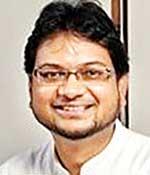 Verite Research Executive Director Dr. Nishan de Mel
Verite Research Executive Director Dr. Nishan de Mel
The DDR is in two parts, one impacting the Central Bank, and the other impacting the retirement savings of the private sector employees for the next 16 years. The Central Bank part misunderstands or miscalculates the genuine impact on dealing with the problem of gross financing needs and is in any case only an accounting presentation treatment instead of an economic sustainability treatment of the debt.
The retirement income part socializes the costs and privatizes the benefits of government debt mismanagement by exclusively squeezing retirement income funds while creating windfall profits for private bondholders, and equity holders of the banks.
 Tea Exporters Association Chairman Ganesh Deivanayagam Eswaran
Tea Exporters Association Chairman Ganesh Deivanayagam Eswaran
DDR is quite a complex and possibly a stage-by-stage exercise which the government has begun by proposing and ratifying the first iteration. There cannot be right or wrong answers in a situation like this.
The fact that the current government is acting swiftly to get all these difficult decisions taken and implemented towards stabilizing the economy is very commendable. Is this the right level of restructuring? We are not qualified to comment on. Is this important to get it done swiftly? Absolutely yes. We all have to trust the current government and the CBSL and support their decisions as long as it has the long-term stability and well-being of our people at heart.
Let’s hope and pray that all this will play out well with all the stakeholders in our sovereign debt situation and that stability and growth returns to our country soon.
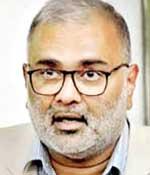 Sri Lanka Association of Inbound Tour Operators President Nishad Wijetunga
Sri Lanka Association of Inbound Tour Operators President Nishad Wijetunga
Based on the assurances given by the secretary Ministry of Finance and the Governor of the Central Bank, this is a good and welcome move. Interest rates coming down as a result of the DDR will affect businesses in our industry positively.
The banking sector not being affected as the restructuring will not include local treasury bonds and bills is indeed very positive. Banks will therefore run smoothly which is a good sign for businesses.
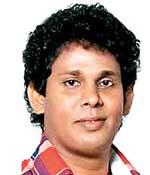 Inter Company Workers Union President Wasantha Samarasinghe
Inter Company Workers Union President Wasantha Samarasinghe
The Domestic Debt Restructuring programme will result in EPF holders losing their interest income. EPF holders have received considerable interest revenue as high as 20 percent, in recent years.
However, under the domestic debt restructuring programme, the EPF guarantees only 9 percent interest. This will cause an income loss for the account holders. When it comes to foreign debt restructuring what the government is proposing is a reschedule where the payback period is prolonged. One wonders why this discrimination. Also, no country which went ahead with debt restructuring such as Zimbabwe or Namibia, opted for domestic restructuring.
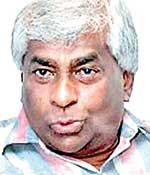 Free Trade Zone Workers Union Joint Secretary Anton Marcus
Free Trade Zone Workers Union Joint Secretary Anton Marcus
Central Bank Governor Nandalal Weerasinghe should call all trade unions for dialogue and explain the domestic debt restructuring programme. It is the prime duty of the Central Bank monetary board to explain to the unions how the EPF and other pension schemes would be affected by the domestic restructuring. Ordinary workers are still unaware as how EPF and other pension funds are going to be affected by this uncertain domestic debt restructuring process.
We are made to understand that the EPF fund holders would get 9 percent interest rates for investments and that it could be reduced further. Also, it has been said EPF would be taxed 30 percent if it decides not to participate in the debt restructuring process. We need a clear picture of the situation.
 Ceylon Chamber of Commerce President Duminda Hulangamuwa
Ceylon Chamber of Commerce President Duminda Hulangamuwa
Given that a debt restructuring is essential for us to be able to meet our gross financing, there is no choice we could achieve a GFN without restructuring the local debt. The US$ 17 billion relief on debt repayment over the next four years cannot be met by entirely restructuring the foreign debt alone. There has to be local participation as well. Thus given our high gearing local debt also needs restructuring.
The impact on the business community is the possible reduction of interest rates as a result of the restructuring of local debt. Once uncertainty in the financial markets is removed and more funds are available for the industry there can be an increase in credit to the private sector and at reduced interest rates the cost of investment and production should hopefully reduce. This should encourage investment, especially in the SME sector thus paving the way for growth of the economy.
However, the government must exercise fiscal discipline so that we don’t start borrowing for consumption and put pressure on government finances.
04 May 2024 4 minute ago
04 May 2024 45 minute ago
04 May 2024 4 hours ago
04 May 2024 4 hours ago
04 May 2024 8 hours ago